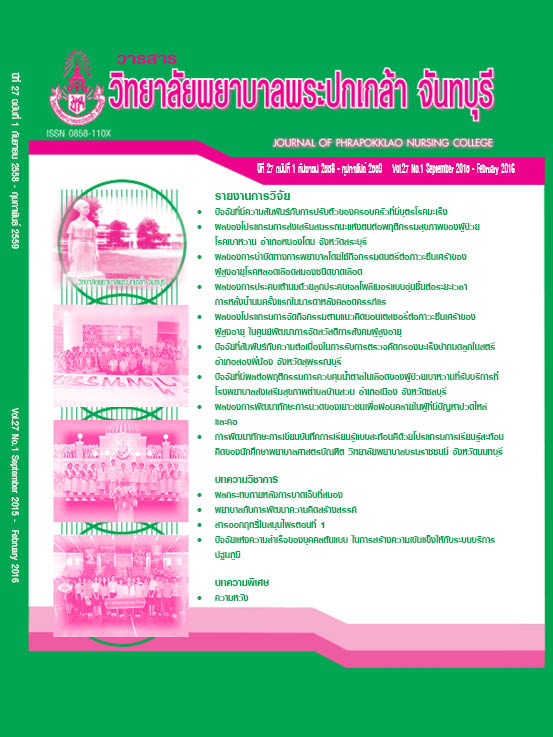Effect of Traumatic Brain Injury
Keywords:
-Abstract
-
References
ดารารัตน์ ปานดี. (2549). ปัจจัยทำนายการเผชิญความเครียดของสมาชิกในครอบครัวผู้ป่วยบาดเจ็บที่สมอง (วิทยานิพนธ์ปริญญามหาบัณฑิต). ชลบุรี: มหาวิทยาลัยบูรพา.
ทิพพาพร ตังอํานวย. (2541). การพยาบาลผู้ป่วยบาดเจ็บที่ศีรษะ (พิมพ์ครั้งที่ 2). เชียงใหม่: โครงการตําราคณะพยาบาลศาสตร์ มหาวิทยาลัยเชียงใหม่.
นิภาวรรณ สามารถกิจ, และสุภาภรณ์ ด้วงแพง. (2544). ผลกระทบของการบาดเจ็บที่สมองที่มีต่อผู้ป่วยและครอบครัว. วารสารคณะพยาบาลศาสตร์ มหาวิทยาลัยบูรพา, 9(1), 11-31.
ประนอม หนูเพชร. (2546). การพยาบาลผู้ป่วยที่ได้รับการผ่าตัดสมอง. สงขลา: ชาญเมืองการพิมพ์.
พรจันทร์ สุวรรณมนตรี. (2550). ปัจจัยที่มีความสัมพันธ์กับภาวะสุขภาพของผู้ป่วยบาดเจ็บที่สมองระดับปานกลางในระยะฟื้นสภาพ (วิทยานิพนธ์ปริญญามหาบัณฑิต). ชลบุรี: มหาวิทยาลัยบูรพา.
พิทยาภรณ์ นวลสีทอง, ประณีต ส่งวัฒนา, และสุดศิริ หิรัญชุณหะ. (2549). อาการเหนื่อยล้าและการจัดการอาการเหนื่อยล้าของผู้ดูแลผู้ป่วยบาดเจ็บศีรษะขณะรับการรักษาในโรงพยาบาล. สงขลานครินทร์เวชสาร, 24(3), 153-161.
รุ่งนภา เขียวชะอ่ำ. (2558). การพยาบาลผู้ป่วยบาดเจ็บที่สมอง: การพยาบาลองค์รวม. จันทบุรี: โรงพิมพ์รักพิมพ์.
วรรณนิษา ตุ้มประเสริฐ, วัลภา คุณทรงเกียรติ, และเขมารดี มาสิงบุญ. (2552). ความต้องการความสุขสบายและการได้รับการดูแลด้านความสุขสบายในผู้ป่วยบาดเจ็บที่สมอง. วารสารคณะพยาบาลศาสตร์มหาวิทยาลัยบูรพา, 17(1), 52-65.
สำนักงานโรคไม่ติดต่อ กรมควบคุมโรค กระทรวงสาธารณสุข. (2556). สถานการณ์อุบัติเหตุทางถนนปี 2556. สืบค้น วันที่ 8 ธันวาคม 2557, จาก http://www.thaincd.com/document/file/info/injured/สถานการณ์อุบัติเหตุปี56.pdf
สุภา ตันติวิสุทธิ์, อำภาพร นามวงศ์พรหม, และศศิธร ศิริกุล. (2554). ประสิทธิผลของการพัฒนาระบบการพยาบาลการใช้แนวปฏิบัติที่สร้างจากหลักฐานเชิงประจักษ์ต่อคุณภาพการดูแลผู้บาดเจ็บที่สมองชนิดรุนแรง. วารสารสมาคมพยาบาลฯ สาขาภาคตะวันออกเฉียงเหนือ, 29(3), 5-13.
อินทิรา ทาเอื้อ, เกศรินทร์ อุทริยประสิทธิ์, ปรางทิพย์ ฉายพุทธ, และบรรพต สิทธินามสุวรรณ. (2553). ความสัมพันธ์ระหว่างกลุ่มอาการภายหลังสมองได้รับการกระทบกระเทือนกับภาวะการทำหน้าที่ในผู้บาดเจ็บที่สมองเล็กน้อย. วารสารสภาการพยาบาล, 25(2), 39-53.
Abelson-Mitchell, N. (2008). Epidemiology and prevention of head injuries: Literature review. Journal of Clinical Nursing, 17(1), 46-57.
Bootcheewan, S. (2007). The relationship between transition conditions and disability in traumatic brain injury patients (master’s thesis). Bangkok: Mahidol University.
Buddhawan, N. (2002). Factors influencing health status of caregivers of post operative neurosurgical patient (master’s thesis). Bangkok: Mahidol University.
Davis, A. E. (2000). Cognitive impairments following traumatic brain injury. Critical Care Nursing Clinics of North America, 12(4), 447-456.
Fujimoto, S. T., Longhi, L., Saatman, K. E., Conte, V., Stocchetti, N., & McIntosh, T. K. (2004). Motor and cognitive function evaluation following experimental traumatic brain injury. Neuroscience and Biobehavioral Reviews, 28(4), 365-378.
Granacher, R. P. (2003). Traumatic brain injury: Methods for clinical and forensic neuropsychiatric assessment. Boca Raton, FL: CRC Press.
Hart, T., Millis, S., Novack, T., Englander, J., Fidler-Sheppard, R., & Bell, K. R. (2003). The relationship between neuropsychologic function and level of caregiver supervision at 1 year after traumatic brain injury. Archives of Physical Medicine and Rehabilitation, 84(2), 221-230.
Hickey, J. V. (2009). The clinical practice of neurological & neurosurgical nursing (6th ed.). Philadelphia: Wolters Kluwer Health.
Hickey, J. V. (2014). The clinical practice of neurological & neurosurgical nursing (7th ed.). Philadelphia: Wolters Kluwer Health.
Kennedy, M. R., & Coelho, C. (2005). Self-regulation after traumatic brain injury: A framework for intervention of memory and problem solving. Seminars in Speech and Language, 26(4), 242-255.
Khan, F., Baguley, I. J., & Cameron, I. D. (2003). Rehabilitation after traumatic brain injury. Medical Journal of Australia, 178(6), 290-295.
Marsh, N. V., Kersel, D. A., Havill, J. A., & Sleigh, J. W. (2002). Caregiver burden during the year following severe traumatic brain injury. Journal of Clinical and Experimental Neuropsychology, 24(4), 434-447.
Martin, C., Viguier, D., Deloche, G., & Dellatolas, G. (2001). Subjective experience after traumatic brain injury. Brain Injury, 15(11), 947-959.
Namasa, A. (2002). Factors predicting health of traumatic brain injured patients (master’s thesis). Bangkok: Mahidol University.
Salmond, C. H., & Sahakian, B. J. (2005). Cognitive outcome in traumatic brain injury survivors. Current Opinion Critical Care, 11(2), 111-116.
Silver, J. M., McAllister, T. W., & Yudofsky, S. C. (Eds.). (2005). Textbook of traumatic brain injury. Washington, DC: American Psychiatric.
Thornhill, S., Teasdale, G. M., Murray, G. D., McEwen, J., Roy, C. W., & Penny, K. I. (2000). Disability in young people and adults one year after head injury: Prospective cohort study. British Medical Journal, 320(7250), 1631-1635.
Tracy, J., Fowler, S., & Magarelli, K. (1999). Hope and anxiety of individual family members of critically ill adults. Applied Nursing Research, 12(3), 121-127.
Vedhara, K., Shanks, N., Anderson, S., & Lightman, S. (2000). The role of stressors and psychosocial variables in the stress process: A study of chronic caregiver stress. Psychosomatic Medicine, 62(3), 374-385.
Wantana, C. (2003). Factors influencing on quality of life among patients with traumatic brain injury (master’s thesis). Bangkok: Mahidol University.
World Health Organization. (2006). Neurological disorders public health challenges. Retrieved November 22, 2014, from http://www.who.int/mental_health/neurology/neurological_disorders_report_web.pdf
Ya-orm, Y. (2001). The effect of promoting family participation in patient care of head injury patients on patient’s health status (master’s thesis). Bangkok: Mahidol University.
Downloads
Published
How to Cite
Issue
Section
License

This work is licensed under a Creative Commons Attribution-NonCommercial-NoDerivatives 4.0 International License.
เนื้อความ ข้อมูล และรายการอ้างอิงที่ผู้เขียนใช้ในการเขียนบทความเพื่อลงตีพิมพ์ในวารสารวิทยาลัยพยาบาลพระปกเกล้า จันทบุรี ถือเป็นความคิดเห็นและความรับผิดชอบของผู้เขียน คณะผู้จัดทำวารสารไม่จำเป็นต้องเห็นพ้องด้วยหรือร่วมรับผิดชอบ
บทความที่ได้รับการลงตีพิมพ์ในวารสารวิทยาลัยพยาบาลพระปกเกล้า จันทบุรี ถือเป็นลิขสิทธิ์ของวารสารวิทยาลัยพยาบาลพระปกเกล้า จันทบุรี หากหน่วยงานหรือบุคคลใดต้องการนำส่วนหนึ่งหรือทั้งหมดของบทความไปเผยแพร่ต่อเพื่อวัตถุประสงค์ใด ๆ จะต้องได้รับอนุญาตจากบรรณาธิการวารสารก่อน



